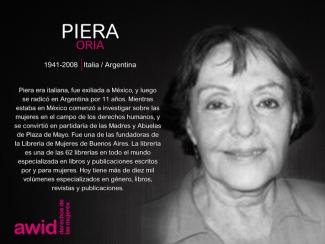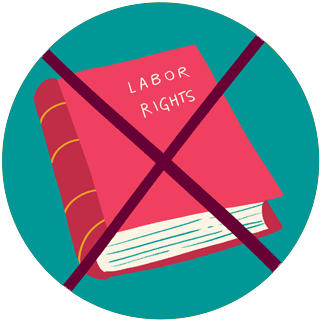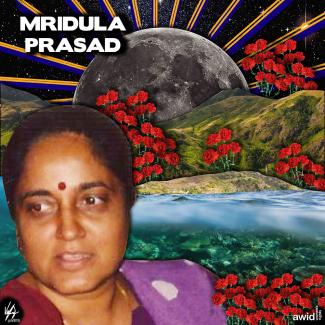Los resultados de la investigación también influirán sobre tu trabajo de incidencia ya que, por ejemplo, te habrán revelado qué sectores otorgan más financiamiento y cuáles consideras que necesitan mayor formación para ejercer su rol de donantes.
En esta sección
Desarrolla la estrategia de incidencia
En la sección de este Manual dedicada a «Prepara el marco para la investigación», te recomendamos que pensaras en las metas que esperabas alcanzar con la investigación. Esas metas te permitirán desarrollar una estrategia de incidencia una vez que hayas completado la investigación.
Una estrategia de incidencia es un plan para difundir los resultados de la investigación de una forma tal que te permita cumplir las metas, dentro del objetivo más amplio que es hacer incidencia con sectores clave para introducir cambios positivos en cuanto a los recursos disponibles para los procesos organizativos por los derechos de las mujeres.
Cómo utilizar las metas definidas en el marco para la investigación:
- Compila una lista con los posibles grupos de contactos a quienes les podrían interesar los resultados de la investigación.
- Para cada grupo, explica en una sola frase cómo te podría ayudar a alcanzar tu meta.
- Para cada grupo, anota el tono que deberás utilizar para comunicarte (formal y profesional, informal, ¿entienden la jerga del sector?).
- Compila una lista de todos los medios que te podrían ayudar a llegar a esas audiencias, el tono adecuado para cada uno, y sus funcionalidades (redes sociales para desarrollar una sensación de comunidad, comunicados de prensa para los anuncios oficiales dirigidos a un público general, etc.).
De esa lista — que será lo más exhaustiva posible — elige los medios más eficientes para alcanzar tus metas. (Más abajo encontrarás ejemplos específicos de audiencias y métodos de incidencia)
Una vez que hayas desarrollado la estrategia, podrás comenzar con la difusión.
Volver al comienzo
Ponte en contacto con tus redes
Para difundir los resultados, primero ponte en contacto con las personas/organizaciones a través de las cuales distribuiste la encuesta, y también con todas las que respondieron la encuesta y fueron entrevistadas.
- Primero, aprovecha la oportunidad para agradecerles por haber contribuido a la investigación.
- Comparte con ellxs los principales resultados de la encuesta y los análisis.
- Facilítales la difusión del producto aportándoles ejemplos de tuits, mensajes para Facebook e incluso una breve introducción que puedan copiar y pegar en su sitio de Internet.
No te olvides de pedirles que identifiquen quién será tu contacto en cada organización y pídeles que te confirmen una vez que hayan realizado cualquier publicación referida a tus materiales.
Esto te permitirá tener un registro de quiénes difundieron el informe pero también construir vínculos más sólidos con las organizaciones y personas con las que trabajas.
Volver al comienzo
Adapta la estrategia a cada sector
A modo de ejemplo te presentamos una lista de sectores sobre los que AWID realiza incidencia.
- Utiliza esta lista como punto de partida para elaborar tus propios planes de incidencia para cada sector.
- Formula un objetivo que esperas lograr en cada sector.
- Asegúrate de agregar a la lista a todo sector que te parezca relevante para tu investigación específica, como por ejemplo ONG o gobiernos locales.
Para esto te resultará útil la lista de organizaciones y personas que te asesoraron durante la investigación (consultorxs). Ellxs te ayudarán a difundir el informe en distintos espacios y también podrán presentarte a nuevas organizaciones o llevarte a nuevos espacios para hacer incidencia.
1. Organizaciones por los derechos de las mujeres
Objetivos propuestos: Que las organizaciones por los derechos de las mujeres actualicen sus conocimientos acerca de las tendencias en el financiamiento; pensar colectivamente iniciativas conjuntas para la movilización de recursos utilizando los resultados de la investigación; influir sobre cómo abordan la movilización de recursos
Ejemplos de posibles métodos de incidencia:
- Organiza seminarios, cafés de aprendizaje u otros eventos en toda tu región, en los idiomas relevantes, para comunicarles los resultados de la investigación.
- Si no puedes llegar físicamente a todxs en tu región, considera la posibilidad de organizar un seminario virtual y presentaciones en línea.
- Presenta los resultados en reuniones importantes como la Comisión de la Condición Jurídica y Social de la Mujer (CSW).
- Además de los boletines y el sitio de Internet de la organización, escribe artículos en diferentes plataformas a las que consulta la audiencia a la que quieres llegar.
Ejemplos: World Pulse (en inglés), OpenDemocracy (en inglés), feministing (en inglés).
2. Bilaterales y multilaterales
Objetivo propuesto: Crear conciencia acerca de cómo el sector del financiamiento no está cumpliendo con sus compromisos establecidos y cómo necesita mejorar los mecanismos de apoyo para financiar los procesos organizativos por los derechos de las mujeres.
Identifica qué entidades bilaterales y multilaterales son las más influyentes en cuanto al financiamiento; esto podría incluir a las sedes locales de las embajadas.
Ejemplos de posibles métodos de incidencia:
- Compila una lista de organizaciones aliadas y personas influyentes (a algunas de ellas tal vez ya las consultaste en el proceso de investigación) que puedan educar a sus pares.
- Pídeles que te ayuden a difundir los resultados de la investigación más ampliamente y con las grandes entidades multilaterales (como la ONU).
- Haz una presentación y/o asiste a espacios influyentes en las que están presentes entidades bilaterales y multilaterales, como GENDERNET (en inglés).
- Publica artículos en los medios que leen quienes trabajan en entidades bilaterales o multilaterales como devex, Better Aid, Publish What You Pay.
3. Fundaciones privadas
Objetivo propuesto: Expandir la calidad y cantidad del apoyo a las organizaciones por los derechos de las mujeres.
Ejemplos de posibles métodos de incidencia:
4. Fondos de mujeres
Objetivo propuesto: Alentarlas a continuar y expandir su trabajo.
Ejemplos de posibles métodos de incidencia:
- Realiza presentaciones en los fondos de mujeres de tu región y en los países sobre los que esperas influir.
- Difunde los resultados de la investigación entre todos los fondos de mujeres que tienen influencia en la región, las temáticas o poblaciones que son prioritarias para ti.
- Considera la posibilidad de encarar iniciativas conjuntas a partir de los resultados de la investigación. Por ejemplo, puedes colaborar con un fondo de mujeres para crear un fondo patrimonial que permita cerrar las brechas en el financiamiento que descubriste con la investigación.
5. Sector privado y nuevxs donantes
Objetivos propuestos: Incrementar su conocimiento del campo y alentar a la coherencia entre sus intereses filantrópicos y sus prácticas comerciales.
Ejemplos de posibles métodos de incidencia:
- Consigue que organizaciones aliadas y personas influentes (a algunas de ellas tal vez ya las consultaste en el proceso de investigación) eduquen a sus pares.
- Organiza reuniones con actores influyentes del sector privado para presentarles los resultados de la investigación.
- Convoca a tu propia reunión, invitando a actores del sector privado, para compartir los resultados y defender tu posición.
Asegúrate de adaptar las presentaciones, propuestas y aplicaciones a cada uno de los grupos a los que quieres llegar.
Volver al comienzo
Paso previo
8. Finalización y formato
¿Estás listx para comenzar la investigación?
Insistimos en recomendarte que consultes nuestra Planilla ¿Estoy listx? para evaluar cómo has ido avanzando.












